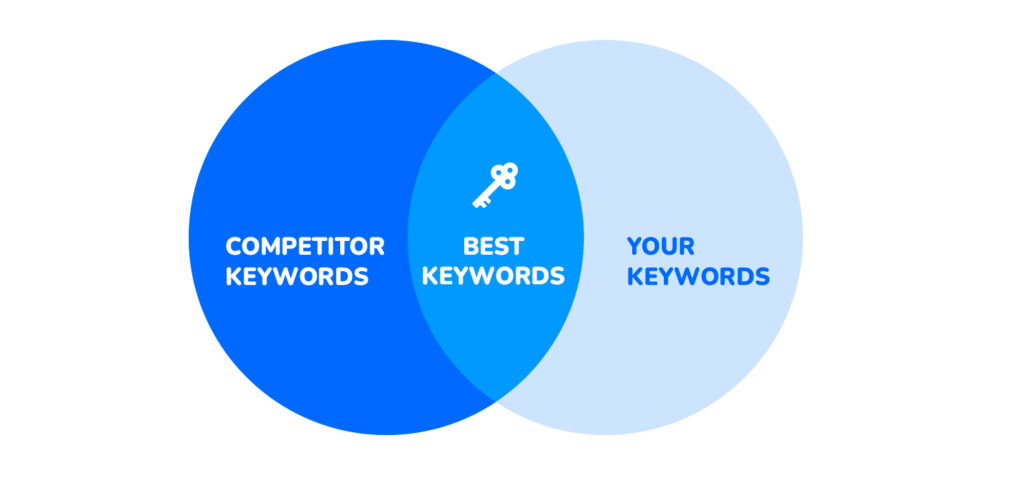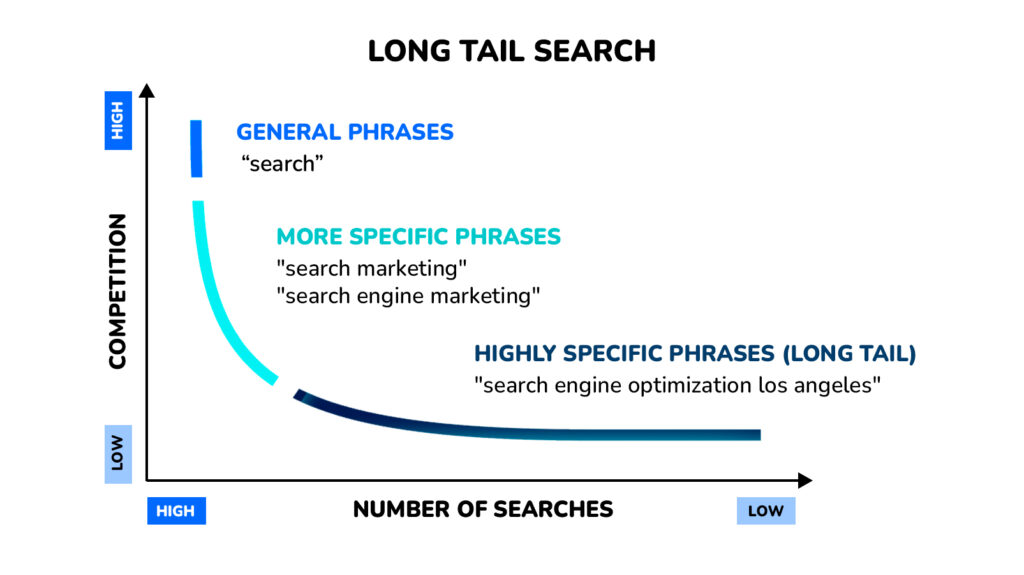Competitor keyword analysis involves studying competitors’ keywords. This process reveals the terms driving their traffic. Understanding these keywords is vital for your website’s growth. By analyzing competitors, you can adjust your strategy. It helps you attract targeted visitors to it and not only that, it also helps you capture more relevant traffic.
Ultimately, knowing their strategies helps you optimize your content.
Competitive keyword analysis identifies keywords used by your competitors. First, figure out who your key rivals are. We are talking about your direct competition, and also those other sites nabbing the same keywords. They’re the ones eyeing the same audience as you! Analyze their tactics and uncover which keywords bring them traffic. Knowing these keywords can boost your SEO strategy. You can target these keywords or find gaps. This leads to higher search engine rankings. Focusing on the right keywords improves visibility. In 2024, over 90% of top content uses such analysis. This underscores its value for SEO success. The main goal of competitor keyword analysis is to discover what’s really clicking in your industry and get inspired by the successes around you.

Why Competitor Keyword Analysis is Important for SEO
Figuring out the keywords your competitors are using can and will give your SEO a boost. By peeking at their keyword performance, you get to learn from both their triumphs and their hiccups. When you analyze competitors’ strategies, you can spot opportunities to tweak and perfect yours. It’s like having a cheat sheet for your own strategy! Think of it as borrowing a few good ideas (just don’t tell them). Targeting keywords already proven effective for others is like finding a shortcut to drive more traffic to your site. Recent research shows, that by finding out that by analyzing competitors, you could see up to a 400% increase in click-through rates! So, why not start investigating? Knowing your competitors’ keyword strategies is a surefire way to get ahead.
How to Identify Competitor Keywords
Several tools can help identify competitor keywords effectively. Ahrefs, SEMrush, and Moz are popular choices. These tools analyze competitors’ websites and reveal their top keywords. They also show keyword difficulty and search volume.
SEMrush
SEMrush is known for its extensive keyword database. It contains over 25 billion keywords, making it comprehensive. SEMrush excels in competitive analysis with visibility scores. It provides insights into keyword difficulty and performance. These features help understand keyword success in SERPs.
Ahrefs
Ahrefs is another star player when it comes to keyword research tools. One of the standout features of Ahrefs is its amazing backlink analysis. It’s like having a backstage pass to see who’s linking to your site and your competitors’ sites, which can give you a real edge.
But that’s not all—Ahrefs also comes with a fantastic Keywords Explorer tool. Picture it as your very own treasure map with a database of over 10 billion keywords. Are you hunting for high-traffic keywords? Or just trying to get a better grasp on what’s trending? Either way, Ahrefs has got you covered.
What’s great about Ahrefs is its reputation for providing super-accurate data on keyword metrics. No more guesswork—just solid insights that help you make informed decisions. And let’s not forget the user-friendly interface: even if you’re not a tech whiz, you’ll find Ahrefs easy to navigate.
So if you’re looking to up your keyword game and (maybe) also dive deep into the world of backlinks and metrics, Ahrefs is definitely worth checking out.
Moz Keyword Explorer
Moz Keyword Explorer is valued for its “SMART” keyword suggestions. It provides unique lateral keyword ideas. Moz offers detailed insights into keyword difficulty and potential. This makes it useful for discovering overlooked keywords.
KeywordTool.io
KeywordTool.io is recommended for beginners. It generates long-tail keyword suggestions across multiple platforms. This includes Google and YouTube, making it versatile. The tool is user-friendly and accessible to newcomers and helps with SEO for small businesses. However, it lacks advanced features like deep competitor analysis.
Case Study: The Power of Long-Tail Keywords
Consider a small eco-friendly retailer using Ahrefs. They analyzed competitors and found missed opportunities. Competitors ranked for broad keywords but ignored long-tail options. The retailer targeted keywords like “affordable eco-friendly kitchen products.” They also used “sustainable household items under $20.” This focus led to a 200% increase in organic traffic. Their conversion rates rose by about 150%. The case highlights how specific keywords can yield significant results.
Tips for Keyword Selection
Here are some tips for effective keyword selection:
- Use Ahrefs’ Keyword Explorer: Filter for high-value keywords.
- Focus on Long-Tail Keywords: These often have lower competition.
- Monitor Competitor Performance: Adjust your strategy based on findings.
- Evaluate Keyword Difficulty: Choose keywords within your site’s capability.
- Track Search Volume: Prioritize keywords with substantial search volume.

How to Do Competitor Keyword Analysis: Step-by-Step
Conducting competitor keyword analysis with, for example, Ahrefs is simple:
- Identify Top Competitors: List your main rivals in the industry.
- Use Ahrefs’ Site Explorer: Enter the domain of a competitor.
- Review Organic Keywords: Examine the list of keywords they rank for.
- Focus on High-Volume Keywords: Look for keywords with significant search volume.
- Analyze Content Performance: Study the content that ranks well for these keywords.
- Improve on Existing Content: Understand why certain content ranks and enhance it.
- Implement Insights into Your Strategy: Apply these findings to optimize your content.
- Regularly Update Your Keyword List: Continuously monitor and adjust your strategy.
Similar approach can be applied to other tools.
Additional Considerations for Competitor Keyword Analysis
Using tools like SEMrush and Ahrefs offers more insights. SEMrush helps track keyword trends and search intent. Ahrefs excels in detailed keyword research and backlink analysis. Moz’s unique suggestions can uncover hidden opportunities. KeywordTool.io is useful for generating ideas but often lacks depth.
When choosing keywords, balance between short-tail and long-tail. Short-tail keywords are broad and highly competitive. Long-tail keywords are more specific and less competitive. Combining both can enhance your SEO strategy. Use data from tools to make informed decisions. Analyze competitors’ keyword strategies regularly for best results.
Importance of Regular Monitoring
Regularly monitoring your competitors’ keywords is crucial, because SEO is an ongoing process that requires adaptation. Competitors may change their strategies, impacting your rankings. The whole world is changing even now, at these exact moments when you are reading this article. Continuous analysis helps you stay ahead of trends. Update your keywords based on market changes and competitor movements. This ensures your SEO strategy remains effective and relevant.
Leveraging Keyword Analysis for Content Strategy
Integrate your keyword findings into your content strategy. Create high-quality content around targeted keywords. Focus on addressing search intent and user needs. Optimize on-page elements like titles, meta descriptions, and headers. Ensure your content provides value and engages readers. Use insights from keyword analysis to guide content creation. Regularly review and refine your strategy based on performance data.
Utilizing SEO Platforms for Comprehensive Analysis
Platforms like Serpzilla can enhance your keyword analysis efforts. Serpzilla offers detailed insights into keyword performance and competition. It helps track rankings and optimize your SEO strategy. Serpzilla is particularly beneficial for smaller businesses seeking affordable yet effective SEO strategies. Utilizing such platforms provides a competitive edge in SEO.
Conclusion
Competitor keyword analysis is a powerful SEO tool. It involves understanding what drives traffic to competitors. By using this knowledge, you can optimize your site. The process includes identifying, analyzing, and implementing keyword strategies. In 2024, successful businesses adapt their strategies based on competitive analysis. Following these steps enhances visibility and attracts targeted traffic. Use tools like Ahrefs, SEMrush, and platforms like Serpzilla. Regular monitoring and adaptation are key to SEO success.
By applying these practices, you can significantly improve your website’s performance and rankings.





